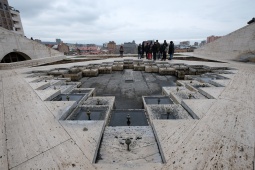Whose Europe? The “New Europe” and Controversy around the European Idea
International Conference in Yerevan, Armenia, and Local Discussions and Interventions in Belarus, Georgia, Ukraine and the Republic of Moldova
The collapse of socialist systems in Eastern Europe and postcolonial moves to restructure the European periphery have brought conflict and even war in their wake, as disputes continue to erupt over the definition and form of national identities. The idea of Europe as a community and the European Union as a supranational and intergovernmental community of states have so far been, and still remain, important frames of reference.
In the cities and regions of Eastern Europe, the parallel processes of reconstituting a national identity and Europeanisation have sparked fierce debates over the European question: How does it relate to the respective history and (re)constitution of each country’s national identity? How can it contribute to forging complex identities? Who belongs to Europe? And when we say “Europe”, what exactly do we mean?
Particularly in cities, artists, activists and urban planners, among others who are vehemently committed to the democratic and European reorientation of their societies, have founded democratically enlightened civic initiatives. With “Wessen Europa? / Whose Europe?”, this fight will be discussed by a broad public and brought into the local discourse. At the same time, an international network of civil society actors will be established.
Workshop and conference
At a conference in Yerevan in March 2019, all project partners presented their initiatives, discussed their different perspectives and draw up an action plan. How might civic initiatives contribute to European unification? What might be the common ground for a “European civic society”?
The developed results will be discussed further with the respective local publics and will be made tangible through artistic-medial interventions as well as an online publication. A public presentation and discussion will present the results of the project in Berlin in August 2019.
At the conference the participants presented a series of public lectures with their reflections on the above-mentioned questions and discussed it with the audience. Three major questions were identified and then further discussed with the attempt made to have them answered:
1. Where is Europe?
Where does it start, where does Europe end? Looking at the geographical representations, it becomes clear how blurred the spatial borders of Europe are - and that, on the contrary, Europe is anchored in our consciousness. Furthermore, this raises the question of what this ‘Europe of our mind’ means: where it is centred, where is the periphery? And is the so-called European periphery possibly developing new governance techniques that require it to be critically examined?
2. Who is Europe?
Is there such thing as a European ‘civil society’ that can raise a common voice beyond the borders of the nation state? ‘Civil society’ means, as it has clearly shown in the Eastern European system transformation, a ‘hard’ concept of (self) responsibility and strong binding forces in resistance to dictatorship and the claim of national emancipation. Is there a perspective for the hard concept with its strong binding character (which implies solidarity among the members) on a European level? Is a European narrative beyond the nation state imaginable, which is non-mythological, unfinished, open (contra identity politics)?
3. To whom belongs Europe?
Who is included, who is excluded from the European idea? It is not only a matter of political equality but also of social justice (solidarity). Is there an idea of a social Europe imaginable? An idea, which can be transformed to an inclusive enlightened and emancipatory narrative? And how can this narrative be inscribed into the bodies of the cities and societies, physically and mentally as well as in the structures of political decision making and governance? How can civil Society claim to say: ”We are Europe?”
A project by stadtkultur international e.V.
Concept and realisation: Kai Vöckler, Archis Interventions / Georg Schöllhammer, Michaela Geboltsberger and Larissa Agel, tranzit.at / Sally Below, CLB Berlin
Project Partners
Armenia
Ruben Arevshatyan (AICA Armenia, National Association of Art Critics)
Nazareth Karoyan (ICA Yerevan - Institute for Contemporary Art Yerevan)
Belarus
Olga Shparaga (European College of Liberal Arts in Belarus - ECLAB)
Sergey Shabohin (artist)
Georgia
Gaga Kiknadze (architect at Architects.ge)
Jesse Vogler (Free University of Tbilisi)
Wato Tsereteli (Center of Contemporary Art – Tbilisi)
Ukraine
Olesia Ostrovska, Anna Pohribna, Solomiya Borshosh (Mystetskyi Arsenal Kiev)
Vasyl Cherepanyn (Visual Culture Research Center)
Moldova
Stefan Rusu ([KSA:K] – Center for Contemporary Art Chișinău)
Vitalie Sprinceana (journalist, co-editor at PLATZFORMA.MD)
The project is funded by the German Federal Foreign Office within the framework of the program "Eastern Partnerships".
A tranzit.at book
tranzit.org/publications
Image: City Tour Yerevan 2019, (c) Stefan Rusu

